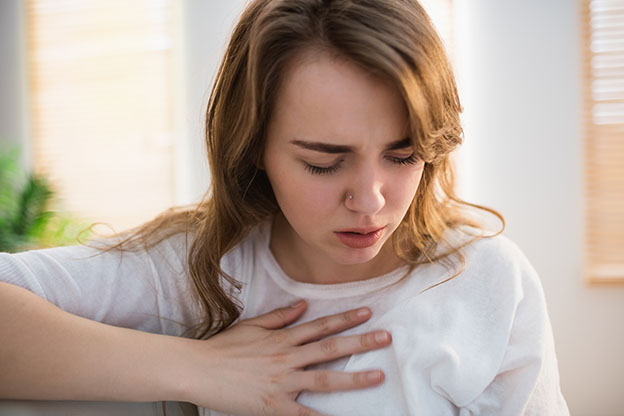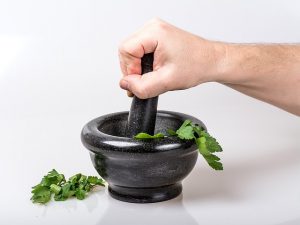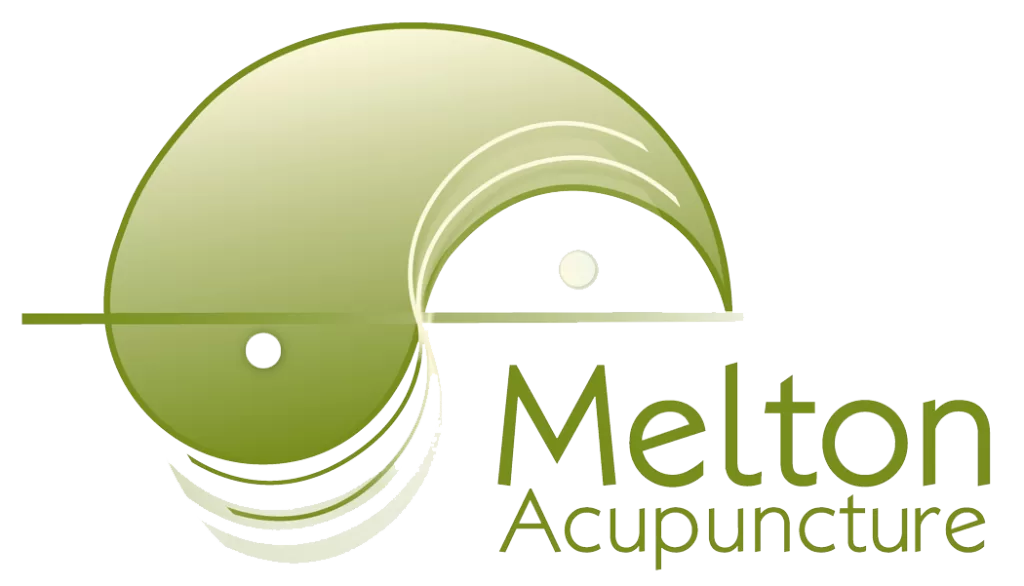Chinese Medicine
The 7 Most Common Things That Cause Heart Palpitations

Heart palpitations can be really scary, especially if you don’t know what they are. The first time you experience palpitations can come with the panic of thinking you’re having a heart attack or that something is seriously wrong with your heart. However, the truth is that palpitations are missed heartbeats, called arrhythmias, and are related to the electrical impulses that causes your heart to beat. The good news is that infrequent palpitations are usually not a sign of serious illness.
A rule of thumb is that if you have occasional palpitations, congratulations—you’re not alone. Most doctors will tell you that everyone misses a heartbeat now and then, but most of us don’t feel it happening. However, if you have frequent palpitations, several missed beats in a row, if it causes lightheadedness or dizziness, or if you feel like your heart is racing, you should definitely get it checked out by your doctor.
In Chinese medicine, palpitations are also related to your heart, which should come as no surprise. However, your heart organ system is more far-reaching in Chinese medicine, which can give palpitations a different and interesting dimension.
While your Chinese heart circulates blood throughout your body, it also has a very spiritual and emotional function. Considered to be the home of your Shen, or spirit, your heart is responsible for your thoughts, feelings, memories, emotions, and your spiritual self.
We instinctively know that our hearts are an emotional organ. You can have a broken heart, feel heartsick, follow your heart, and thank someone from the bottom of your heart. It follows, then that whenever you have an emotional upset, your heart is involved.
In Chinese medicine, the emotional connection to your heart is always a consideration in diagnosing palpitations. In many cases palpitations can be brought on by stress, an emotional upset, and even working too hard. Often palpitations are accompanied by anxiety, insomnia, memory issues, dizziness, and ringing in your ears. There are a number of patterns, or clusters of symptoms, that are related to palpitations, and a practitioner of acupuncture and Chinese medicine will need to understand the nature of those symptoms in order to treat your palpitations effectively.
There are also a number of physical issues that may cause or aggravate your palpitations, including:
- Medications. Several prescription and over-the-counter medicines have the ability to cause palpitations. Read the information on side effects that comes with your medications, check with your doctor, or talk to your pharmacist if you suspect a medication you’re taking is causing palpitations.
- Take stock of your caffeine consumption. Caffeine speeds things up, including your heart, and can cause palpitations.
- Monitor your drinking, too. Alcohol abuse can be a source of palpitations in some people.
- If you smoke, quit now. You already know that smoking isn’t good for your heart or lungs, but may not know that it can cause heart arrhythmias. Clearly, quitting smoking is easier said than done, especially if you’ve smoked for a long time. However, if you decide to quit, acupuncture can help you by decreasing the intensity and frequency of cravings and managing stress.
- While exercise is a good thing, make sure you start slowly. Jumping into a hard workout without any warmup can be a trigger for palpitations.
- If you’re under a lot of stress, do whatever it takes to manage it. Stress and emotional upsets can trigger or aggravate palpitations.
- Avoid overeating. If you’re prone to palpitations or arrhythmias, episodes of overeating can overload your heart and trigger an episode.
 Daniel Melton is a California board certified acupuncturist and herbalist. He earned a B.S. in biology, completed his Masters in Traditional Chinese Medicine, and is the founder of Melton Acupuncture in Morgan Hill, CA.
Daniel Melton is a California board certified acupuncturist and herbalist. He earned a B.S. in biology, completed his Masters in Traditional Chinese Medicine, and is the founder of Melton Acupuncture in Morgan Hill, CA.
If You Suffer From Sinusitis, This May Be The Solution You’re Looking For…

Anyone who has suffered through a sinus infection will tell you that the symptoms can be severe and may completely lay you low for weeks. Facial pain, fever, and pressure in your forehead or cheeks are the most common symptoms of a sinus infection. In addition, you may experience a runny or stuffed up nose, loss of ability to smell or taste, sensitive or sore teeth, and bad breath. And the fatigue—many patients know their sinus issues have ramped up into infection status because they feel completely run down and exhausted.
What Causes Sinusitis?
A sinus infection and acute inflammation of your sinuses are conditions that tend to linger. They can last for weeks and even a month or more, and can be acute or chronic. An acute infection of your sinuses is commonly caused from nasal congestion due to a common cold, flu, or allergies. In contrast, chronic sinusitis can last for months or longer, and is most frequently caused by a structural problem, such as a deviated septum, nasal polyps, and swollen sinuses that obstruct drainage.
In Western medicine sinus problems are commonly treated with medications, such as antihistamines, antibiotics, and steroids. In severe cases, surgery may be recommended to repair a structural issue or to open your sinuses.
Natural Solutions for Sinus Pain:
In Chinese medicine, sinusitis is considered to be obstruction of phlegm, which also blocks the circulation of blood and energy in the area. Therefore, treatment for sinusitis is directed toward opening up your sinuses so they can drain, increasing circulation and flow of air, as well as controlling phlegm, which is commonly the original source of your sinus problem. A buildup of phlegm can come from a number of causes that may seem unrelated to your cranky sinuses. Poor digestion, eating too many of the wrong foods for your body constitution, an inability to metabolize fluids well, and a weak immune system may all cause accumulations of phlegm in your body.
Treatment for sinusitis or a sinus infection using Chinese medicine would include acupuncture, with needles placed in specific spots to open and drain your sinuses, as well as points on your body to deal with the phlegm and any other issues contributing to your condition. In addition, there are some very effective herbal formulas that can clear your sinuses and dry out the phlegm. Your practitioner will likely also point you to some diet modifications, such as avoiding lots of sweets, dairy, and very rich or greasy foods, as well as choosing foods specifically suited to your body.
A few at-home steps to help relieve your symptoms include:
- Get and use a Neti pot or some other way to rinse your sinuses. Neti pots or saline nasal sprays can be found at your local drug store. To avoid burning, combine one teaspoon of salt with a pinch of baking soda into two cups of distilled water, then rinse.
- Use a little steam to open up your sinuses. A hot shower or standing over a pan of boiling water (careful not to burn yourself!) can help open things up.
- If you’re very uncomfortable, try moist heat. Place a moist towel or washcloth in the microwave for about 30 seconds. Then place it on your face where you’re feeling pain or pressure. Again, be careful—the cloth should be comfortably warm, not scorching hot.
- Take it easy on the decongestant nasal sprays. They may bring you relief in the short term, but are notorious for causing a rebound effect, making your nasal congestion worse than before.
- Be sure to stay hydrated, which keeps the mucous thin and more likely to drain.
- Give your body the rest it needs to recover and heal.
It’s not a given that you need to live with chronic sinus pain, frequent infections, or be tied to taking antihistamines, antibiotics, or steroids for the rest of your life. Acupuncture and Chinese medicine may be the solution you’ve been looking for in treating your sinus issues—ask your practitioner how they can help.
 Daniel Melton is a California board certified acupuncturist and herbalist. He earned a B.S. in biology, completed his Masters in Traditional Chinese Medicine, and is the founder of Melton Acupuncture in Morgan Hill, CA.
Daniel Melton is a California board certified acupuncturist and herbalist. He earned a B.S. in biology, completed his Masters in Traditional Chinese Medicine, and is the founder of Melton Acupuncture in Morgan Hill, CA.
All About Moxibustion
 Traditional Chinese Medicine is a medical system that incorporates numerous methods for treating disease and illness. One of the tools found in the toolbox of the TCM practitioner is known as moxibustion.
Traditional Chinese Medicine is a medical system that incorporates numerous methods for treating disease and illness. One of the tools found in the toolbox of the TCM practitioner is known as moxibustion.
Moxibustion is a technique that involves the burning of mugwort, known as moxa, which is an herb that facilitates healing. The purpose of moxibustion is to stimulate the flow of Qi (pronounced “chee”), strengthen the blood and maintain general health. Qi is translated as life energy. There are two types of moxibustion, direct and indirect. Direct moxibustion uses moxa shaped into a small cone and is placed on top of an acupuncture point and burned. This type of moxibustion has two subcategories, scarring and non-scarring. Scarring moxa burns until it distinguishes on its own. This may lead to localized scarring and blisters. Non-scarring moxa allows for the moxa to be placed on the acupuncture point, lit, extinguished and removed before it burns the skin.
Non-scarring moxibustion creates a pleasant heating sensation that penetrates deeply into the skin, but does not create a scar or any pain. Indirect moxibustion is the more popular of the forms. In indirect moxibustion, a practitioner lights one end of a stick of moxa and holds it close to the acupuncture point for several minutes until the area turns red.
Moxibustion is used to help people with cold or stagnant conditions. Burning moxa is believed to expel cold and warm the energetic meridians, which creates the smooth flow of Qi and blood. Moxibustion also supports the yang energy, which strengthens and increases the original Qi. Moxibustion can be used to treat many conditions including back pain, muscle stiffness, headaches, tendonitis, arthritis, digestive disorders, anxiety, menstrual cramps, irregular periods and infertility. Moxibustion is not recommended for diabetic patients, since they have decreased sensitivity to pain and compromised circulation.
Moxibustion is very effectively used in patients that have a cold constitution. Many chronic conditions, even the ones that manifest as heat conditions, can have chronic cold as the underlying situation. A cold constitution is triggered or aggravated by over cooling the body systems. Because of technological advances, our bodies are exposed to cold at a much higher rate than in the past. Things like refrigeration, air-conditioning, iced beverages and even ice cream have created a society of people with cold constitutions. Also many pharmaceutical drugs including over-the-counter pain medications are known to decrease body temperature. Large consumption of fruits and raw vegetables and ongoing mental and emotional stress can also create cold constitutions. Therefore using moxibustion is frequently warranted in the treatment of many illnesses and diseases.
Moxibustion on the acupuncture point Stomach 36 also has the function of preventing diseases and maintaining health. In ancient China, this technique was known as reverse moxibustion. Even if a person is quite healthy, regular moxibustion on this point can invigorate healthy Qi and strengthen the immune system, thus increasing longevity. Perhaps this is why the point has been nicknamed the “longevity point”.
As with acupuncture, only a licensed practitioner should be called upon for treatments such as moxibustion. If you believe that moxibustion may be helpful with your medical conditions, be sure to discuss it with your acupuncturist.
The Many Dimensions of the Kidney

Acupuncturists understand the body as a complex system of energy systems, meridians and organs. However, when an acupuncturist talks about an organ, like the spleen, heart or kidneys, they are not referring to the physical organ that sits inside your body, but rather the energetic side of these organs. The energetic system is much bigger than just the physical organ, and governs certain functions in the body on many levels.
The kidney system is one of the most important of these energetic organ systems.
In Traditional Chinese Medicine, the kidneys represent the deepest, most fundamental levels of energy in the human body. They are said to be the root of yin and yang in the body – two fundamental forces at play in our physiology. The kidneys also store a substance called “essence” that is our genetic code, our life force and our reproductive ability.
The kidneys in Chinese Medicine are related to the water element, which is the elemental energy of winter. Whereas many energy systems are all about movement, the kidneys are about rest, relaxation, rejuvenation – they are the energy of holding, of turning inward, of protecting that which is most important. Think of still reflecting pools, or a quiet winter night. These are kidney energy. The kidneys are often referred to in Chinese Medicine as our “root” – they are tasked with caring for the most precious parts of us that make us who we are.
On a physical level, the kidneys govern the water passageways within the body (appropriate being the water element!) as well as controlling growth and reproduction. In a five element understanding of Chinese Medicine, the kidneys are at the end of the life cycle, before rebirth occurs again (such as winter making way for spring.) This means the kidneys in particular have a vital role to play in end of life transitions.
The spirit aspect of the kidneys is called Zhi, or willpower. Again, the kidneys are our root, our fundamental and core energy. When that system is weakened, a person may not feel drive, motivation or have the ability to push themselves. Their understanding of who they are and what they can do has been diminished.
The emotion associated with the kidneys is fear. When the kidneys are weak, a person may be startled or frightened easily, or may experience fear in disproportionate ways. Likewise, shock, trauma and fearful situations weaken the kidney energy, which is why many of the common symptoms of PTSD have a kidney imbalance at their root. The person’s core has been shaken.
The kidney energy, being the deepest level of energy in the body, takes time to replenish and strengthen, which means patience is key. Also, the kidney energy naturally declines over the life cycle, which is the normal aging process. So as we age, protecting the kidneys becomes all the more important!
Nourish the Kidneys through Food
Being associated with the water element, the kidneys are nourished by foods that come from the water – fish, seaweeds and shellfish are nourishing to this system. The kidneys are associated with the salty taste, so naturally salty foods such as miso or millet also are good choices. Avoid foods that are damaging to your root energy, such as sugar, caffeine, alcohol, greasy foods and highly-processed foods.
Nourish the Kidneys through your habits
The kidneys are damaged by overwork, too much responsibility, lack of sleep and a frenetic schedule. In other words, most of us living in modern society are taxing our kidneys! This means it is all the more important to carve out time and space to take part in kidney-nourishing habits.
As we mentioned, the kidneys are nourished through rest and rejuvenation. Pay attention to your sleep, and be sure you are getting the hours that you need! Take a nap in the day if you need it. Engage in gentle, relaxing forms of exercise, like yoga or tai chi. Try meditation or guided visualizations to calm and center yourself. Find a schedule that works – one that really works – for you.
Bring the water element into your life and your home by getting a small decorative fountain, using essential oils, taking baths or spending time near rivers or oceans or other bodies of water.
The kidneys, being the source of our reproductive strength, are also weakened by excessive sexual activity. So go for quality over quantity.
The kidneys represent what makes you, you. So take the time to give them the support they need!
Acupuncture For TMJ Dysfunction
Temporomandibular joint dysfunction (TMJ) is a common condition that is characterized by pain and jaw dysfunction. TMJ is used to describe a wide range of conditions associated with jaw pain and restricted jaw movement. While TMJ isn’t life-threatening, it can negatively impact a person’s quality of life, causing bouts of insomnia, stress, pain and disability.
It’s estimated that up to 30 percent of the world’s adult population suffers from TMJ, most of whom are between the ages of 20 and 40. Many people living with this condition simply mask the pain with prescription painkillers or other medications. In doing so, however, they create other problems, such as increased stress on the liver and stomach. Acupuncture offers an alternative treatment that instead of masking the pain, works to reduce symptoms at the source.
While there’s no guarantee that it will cure your condition, several studies suggest that it acupuncture does in fact help relieve the pain and other symptoms associated with TMJ. One recent study involving 70 dental patients in the U.K. found that acupuncture relieved their pain by as much as 75 percent. Another study found acupuncture to offer long-term patient satisfaction when used to treat TMJ (acupuncture treatment was given 18-20 years prior to the follow-up).
The 2,000-year-old practice of acupuncture involves the placement of thin needles directly under the skin in specific locations known as acupuncture points. Acupuncturists believe that when we are healthy, our body is in balance and our natural energies are flowing properly. There are times when the body’s natural flow will be blocked, disrupted, or stagnant, leaving the person susceptible to disease and illness. Acupuncture works by releasing these blockages through acupuncture points to return your body to its natural flow.
Acupuncture is also known to stimulate the body’s self-healing process, which could in turn relieve the muscle tension attributed to TMJ. People with TMJ often clench or grind their jaws without realizing it. Acupuncture treatment can help relax the muscles from their clenched position.
Give me a call today to learn how you can get back on track to better health!
Sources: http://www.altmd.com/Articles/Acupuncture-for-TMJ, http://www.dentistry.unc.edu/patient/acupuncture/documents/brochure.pdf



